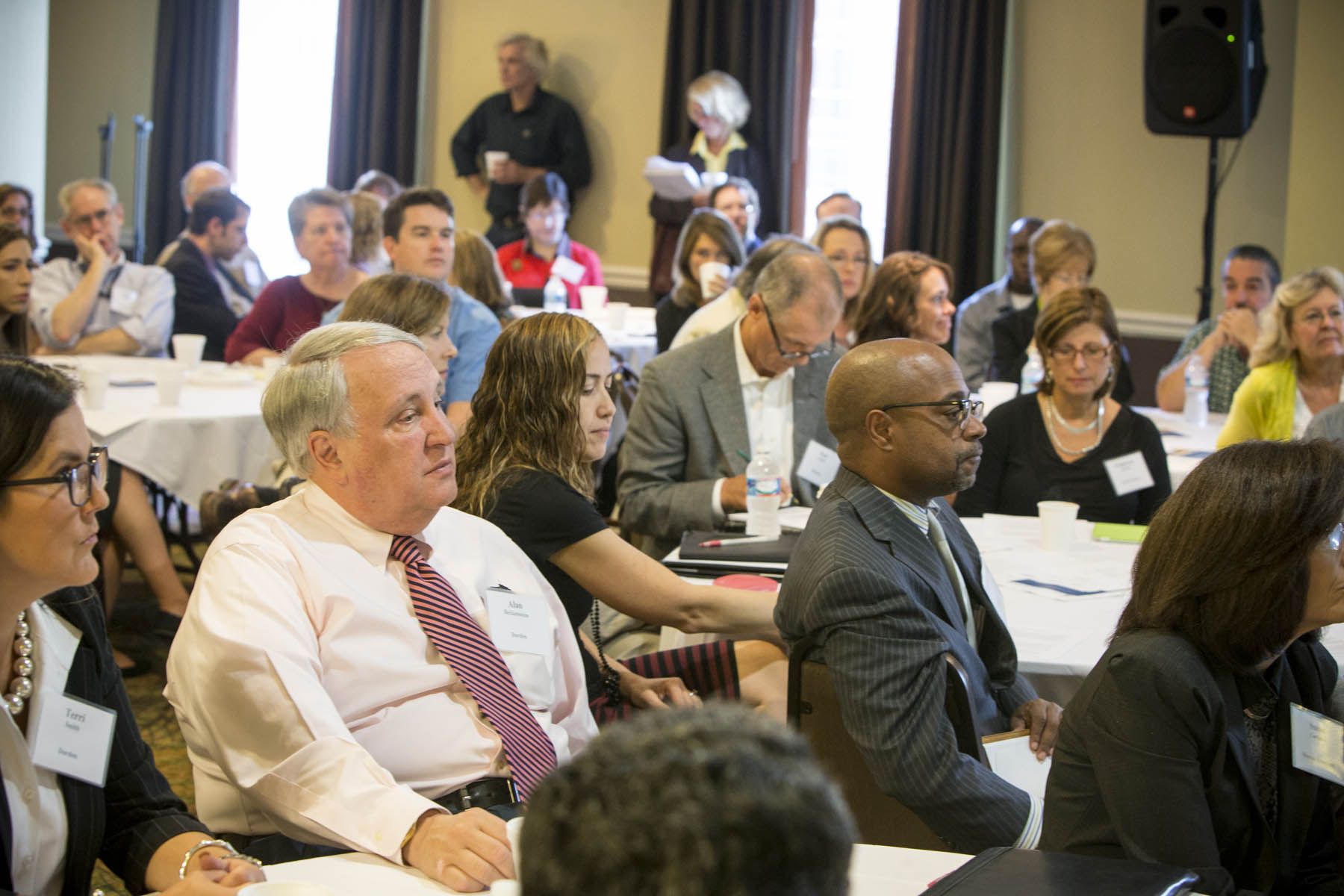With 100 faculty searches getting under way this year on Grounds, not to mention the wave of faculty retirements projected to continue over the next decade, University of Virginia President Teresa A. Sullivan emphasized the importance of faculty hiring in U.Va.’s strategic planning at a symposium Wednesday.
At the event, “Recruiting the Most Qualified Candidates Using Effective, Fair Searches to Hire Excellent Faculty,” she encouraged the audience of about 100 department chairs and faculty members who are serving on search committees to find the best candidates to ensure U.Va.’s future excellence.
The University’s strategic plan, which is nearing final draft form, will include language making faculty hiring “more robust and continuous,” Sullivan said. She asked attendees to keep in mind that they’re not just recruiting top candidates to their department or school, but to the University as a whole.
Sullivan urged the members of search committees to take advantage of U.Va.’s many resources to help them conduct successful searches. She even offered the possibility of meeting with a top candidate herself, or asking Executive Vice President and Provost John Simon to do so.
Organized by the Office of the Vice Provost for Recruitment and Retention, the half-day meeting, held at the Cavalier Inn, featured guest speaker Joan Williams, founding director of the Center for WorkLife Law at University of California Hastings College of the Law, who spoke about research on implicit bias against women and underrepresented minorities and how to avoid its negative effects on faculty searches.
In discussions with Williams and during several panel discussions, the participants reviewed recruiting strategies, talked about a fictional case study of a faculty search, looked at data from their own departments and asked questions of faculty and staff with expertise in the hiring process.
There were also several sessions sponsored by U.Va.’s ADVANCE program that focused on active outreach to encourage more applications from women in science, technology, engineering and math – the so-called STEM disciplines – as well as in social and behavioral sciences and economic disciplines, known as SBE. The program, funded by the National Science Foundation, seeks to increase the participation of women in STEM and SBE fields at U.Va.
Gertrude Fraser, vice provost for recruitment and retention, and Pamela Norris, associate dean of research and graduate programs and Frederick Tracy Morse Professor of Mechanical and Aerospace Engineering in the School of Engineering and Applied Science, who are leaders of the ADVANCE program, announced a new resource to aid a faculty search in the STEM and SBE fields: a career-life balance initiative grant from NSF. The grant will provide one year of dual-career full-time salary and benefits.
Employment for a spouse is one of the most important factors in a faculty candidate accepting an offer., Fraser said. Data show that 78 percent of female professors in the sciences are married to scientists. Search committees can turn to Human Resources’ office for dual career recruitment to help find job placement for spouses, she said.
A panel of U.Va. faculty members and a Human Resources consultant experienced in faculty searches shared a range of recruiting strategies. Dr. Sim Galazka, professor of family medicine in the School of Medicine; Joe Poon, William Barton Rogers Professor of Physics; Archie Holmes, professor of electrical and computing engineering; and Catherine Brand, who works on the Executive Search Group, all agreed that publishing advertisements for job openings is only one tool in what should be a multi-pronged approach.
The panelists stressed that faculty members should consider search committee work as part of their service duty, and if necessary, should ask for a break on other service activities.
Their recruiting suggestions included turning to networks of colleagues to ask about potential job candidates to field a diverse pool, and making personal contact with those individuals; trying innovative ideas, such as the physics department has done by producing a video for recruiting; being reflective during the search process to review whether the pool is diverse and the process is going well, and making changes if necessary; and keeping in touch with potential candidates, even if they can’t be hired at the time.
In Williams’ presentation, she offered several other suggestions about talking with job applicants.
She said gender bias still exists as a major issue affecting women in academia, despite hundreds of studies identifying and analyzing gender bias and more than 20 years of efforts to boost numbers of female faculty. Bias also affects the numbers and experiences of under-represented minorities.
As of 2011, U.Va. ranked 56th out of 62 research institutions in the American Association of Universities in its percentage of tenure/tenure-track women on the overall faculty, said Karen Kurotsuchi Inkelas, associate professor and director of the Center for Advanced Study of Teaching and Learning in Higher Education at the Curry School of Education.
Williams noted that we are all subject to implicit bias – unconscious assumptions and cognitions – about people and situations that can negatively influence evaluations and decision-making about women and minority candidates. Search committees should understand these biases in order to avoid them as they recruit and hire the next generation of top faculty, she said.
Universities can use family-friendly policies as a recruiting tool, Williams suggested. Search committee members should not ask individual candidates if they plan to have children, but can give all candidates the same information. To support the recruiting effort, the U.Va. ADVANCE program has published a faculty guide that can be distributed to candidates who want to learn about available community and University resources.
Media Contact
Article Information
September 30, 2013
/content/faculty-focus-recruiting-strategies-attracting-new-colleagues-uva

